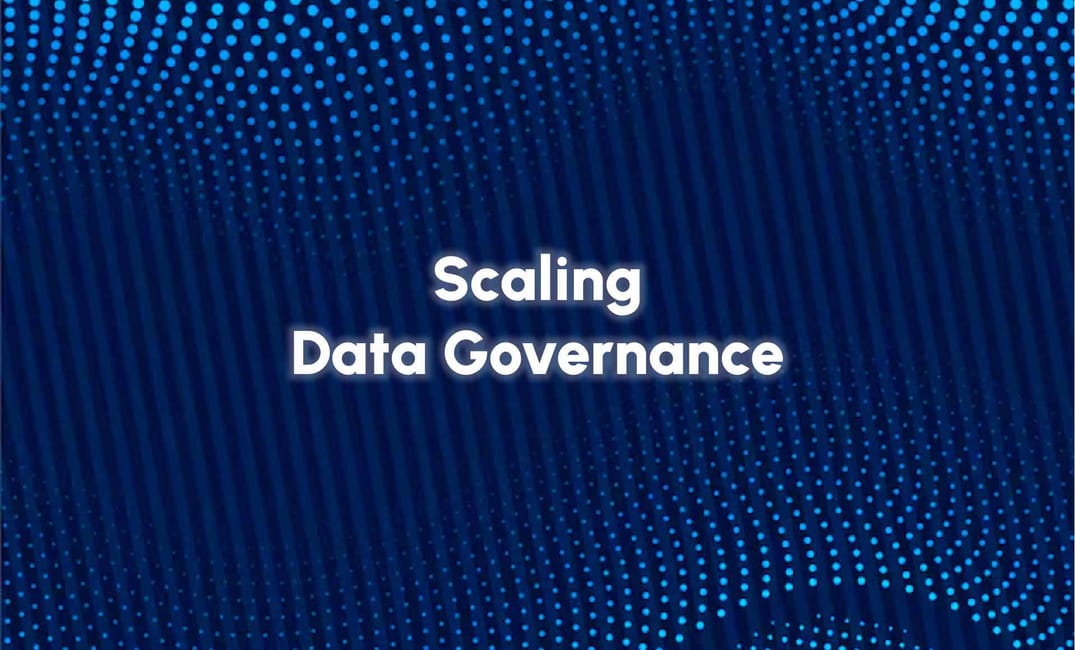Effective data governance ensures data remains accurate, accessible, and compliant with evolving regulations. However, scaling governance processes introduces challenges, from integrating diverse data sources to maintaining robust security and privacy across regions. Rather than layering controls, scaling data governance involves creating a dynamic framework that supports growth while safeguarding data integrity.
This article explores the principles and practices necessary for scaling data governance effectively. By addressing key challenges and leveraging advanced tools, organizations can establish a resilient foundation for sustainable growth.
Why Scaling Data Governance Matters
Data governance forms the backbone of strategic decision-making, allowing businesses to extract value from their data while mitigating risks. As organizations scale, they accumulate data from numerous sources, manage higher volumes, and often operate across regions with distinct regulatory environments. Without scalable governance, these complexities can lead to fragmented data, compliance issues, and missed opportunities for innovation.
Scaling governance ensures that data remains:
- Accurate, maintaining consistent and reliable information across systems.
- Accessible, allowing teams to securely access needed data without delays.
- Compliant, adhering to privacy regulations like GDPR, CCPA, and emerging frameworks.
By prioritizing scalable governance, organizations enable their teams to act confidently on high-quality data, fostering innovation and strategic agility.
Key Elements of Scalable Data Governance
To scale data governance successfully, organizations must rethink traditional approaches and adopt practices aligned with growing demands.
Centralized Oversight with Distributed Execution
A scalable governance model balances centralized oversight with distributed execution. While a central team establishes policies, standards, and compliance frameworks, execution is delegated to individual departments or regions. Effective coordination can include regular cross-departmental meetings and shared governance platforms, ensuring alignment across teams. For example, a multinational corporation might set global data standards while allowing local teams to adapt practices to regional regulations, ensuring consistency and flexibility.
Dynamic Data Cataloging
Dynamic data catalogs offer scalable solutions for tracking and organizing data assets. Unlike static inventories, dynamic catalogs automatically update as new data sources are added, providing real-time visibility into data lineage and usage. This transparency fosters accountability and ensures control over expanding data ecosystems.
Automation and AI Integration
Automation reduces the manual effort required for governance, making processes scalable as data volumes grow. AI-powered tools can identify anomalies, flag compliance risks, and enforce data quality rules in real time. These technologies ensure governance frameworks remain efficient and responsive, even in highly complex environments.
Privacy by Design
Embedding privacy into data practices from the outset is critical for scaling governance. Privacy by design ensures compliance requirements are integrated into systems and workflows, minimizing costly retrofits. For example, automated consent management and anonymization protocols simplify adherence to regulations while safeguarding customer trust.
Tools and Technologies for Scalable Governance
Advanced tools and technologies play a pivotal role in scaling data governance. These solutions enhance visibility, automation, and compliance capabilities.
Data Governance Platforms
Platforms like Collibra and Informatica allow organizations to define and enforce governance policies across ecosystems. Key features include role-based access control, data lineage tracking, and compliance monitoring.
AI-Powered Compliance Tools
Tools such as BigID and OneTrust leverage AI to manage privacy risks, automate consent tracking, and ensure regulatory compliance at scale.
Data Quality Management Solutions
Solutions like Talend and Trifacta focus on maintaining data quality by identifying errors, inconsistencies, and gaps. These tools help enforce data integrity across diverse sources and formats.
Event-Driven Architectures
Event-driven architectures powered by technologies like Apache Kafka enable real-time monitoring of data flows. This approach supports proactive governance by detecting anomalies and dynamically enforcing policies.
Overcoming Challenges in Scaling Governance
Scaling data governance brings significant benefits but also presents challenges. Addressing these proactively is essential for success.
Resistance to Change
Adopting new governance practices often requires cultural shifts. Engaging stakeholders early, offering training, and demonstrating the tangible benefits of improved governance can help overcome resistance.
Balancing Flexibility and Control
Finding the right balance between centralized control and local flexibility is crucial. Establishing clear guidelines while allowing departments to tailor practices to specific needs fosters both consistency and adaptability.
Managing Costs
Scaling governance can involve significant investments in tools and expertise. Organizations should prioritize high-impact areas, launching pilot projects to demonstrate ROI before expanding initiatives.
Benefits of Scalable Governance
Effective data governance unlocks numerous strategic advantages. High-quality data supports informed decision-making and drives innovation, while robust compliance frameworks reduce legal and reputational risks. Scalable governance enhances operational efficiency by streamlining workflows and minimizing manual effort. Additionally, businesses that prioritize governance build trust with customers and stakeholders, creating a competitive edge and positioning themselves for long-term success.
Conclusion
Scaling data governance is both a technical necessity and a strategic imperative for growing organizations. By adopting centralized oversight, dynamic cataloging, and automation, businesses can establish governance frameworks that adapt to evolving needs. Advanced tools further strengthen these capabilities, ensuring data remains a reliable and valuable asset.
As organizations navigate the complexities of growth, scalable governance provides the foundation for sustained compliance, innovation, and efficiency. Investing in these practices today equips businesses to meet future demands with confidence. Begin scaling your data governance efforts now to unlock the full potential of enterprise data.

